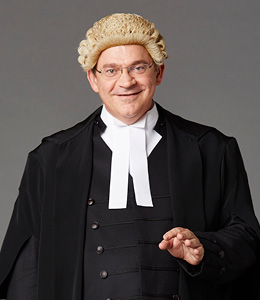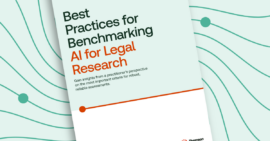
“I solved a complex legal problem the other day – one that was upsetting my solicitor and confusing my junior – in less than a minute. It only took one search, and the first case that came up was the one we needed. I almost felt a bit smug.”
We recently had the privilege of meeting with Mark Robinson SC, barrister at Maurice Byers Chambers and Westlaw AU Editor and Author, who shared with us his ingredients for success in the legal world; advocacy and a passion for research.
It was Mark’s love of research that led to him contributing to Thomson Reuters in 1996 – initially writing a looseleaf service on administrative law to complete an existing suite. In the years since, he has moved on to become an editor and author for several Westlaw AU titles, and a crucial influence on the quality of the platform’s content.
In this interview Mark takes us on his Westlaw AU journey; he reveals how Westlaw has helped him win some pretty tough cases over the years and continues to solve his complex legal problems.
Q: What led you to start working with Thomson Reuters as an author and editor?
A: How I came to be an author and editor for Thomson Reuters is an interesting story. Thomson Reuters had published a series of looseleaf services in my area of specialty (administrative law) for Federal Law, VIC and QLD, and I was trying to lobby to establish a general merits review tribunal in NSW at that time. In 1994, I approached them asking if they would complete their suite of services by adding NSW. They agreed, and asked if I would write it. It took about six months, working around my existing work commitments (and teaching at the University of NSW).
Then in 1996, I was offered the editorship for the Administrative Law title of The Laws of Australia encyclopaedia. I wanted to see the job done well, and because I knew most of the authors in the area, I was in a good position to take on the role. I’ve now been working with Thomson Reuters for more than 20 years, currently as author and editor for the NSW Administrative Law service and the two Administrative Law volumes of The Laws of Australia.
Q: You’ve had a long and impressive career – how long has Westlaw AU been a part of it?
A: I first encountered Thomson Reuters – which was then known as Law Book Company – back in 1980 as a student. I gravitated towards them as the information always seemed better and more current. I used it all through university and never really stopped! My first job was at the NSW Law Reform Commission, and it was very research-intensive, so I used Thomson Reuters a lot. Then I got a research position at the High Court for two years before becoming a solicitor and then being called to the Bar.
I have always loved research – in fact I believe there are two skills that make one successful as a barrister: research and advocacy. If you keep on top of both of those, you’ll smash it. Early on when I was studying at Macquarie University, I was told to make the reference librarian my best friend. So I followed the reference librarian everywhere and learnt everything I could. You don’t really need to do that anymore, but it certainly taught me a lot. I also learnt a disciplined approach to research when working at the High Court. Back then, Westlaw hadn’t launched in Australia so you had to order a search from the United States at $25 a pop. That meant you really had to plan your searches and select your Boolean operators, and feel pretty confident you’d retrieve what you needed.
Q: What do you like best about Westlaw AU?
A: Three main things draw me to Westlaw: its power, speed and comprehensive nature. FirstPoint is the best “noter upperer” out there – it doesn’t just show you statute, it shows how they’ve been interpreted. After all, it’s all just words on a page until it’s interpreted.
Research is a voyage of discovery. You rarely find nothing – and you often find something useful in another case. Research really can take you to places you don’t expect. In many ways I miss the manual research, browsing in books – having a good sticky beak before and after a case. That said, the computer is a powerful tool. And with Westlaw you can still browse through hierarchical results and find clumps of related cases quickly and within a defined area.
Westlaw is dead centre of my bookmarks – it never moves.
Q: Can you think of a particular instance (or case) when Westlaw AU made a difference?
A: I use Westlaw routinely, almost every single day. But there are three cases I can recall where I used it to achieve a really satisfying result.
The first was three or four years ago, when I represented the Hells Angels. New legislation had been put in place that meant members of “declared” organisations weren’t allowed to communicate with one another – or else they’d go to jail. Their solicitor approached me – I wasn’t a senior counsel at the time, but he felt I could win. I knew the High Court principles had been evolving, so I studied these and new cases. Using this, I successfully argued that the legislation was unconstitutional – they actually tore up the entire Act in the judgment.
The second was earlier on in my career when I led a class action in the High Court against the Refugee Review Tribunal. We’d found they had not passed on documentation that could potentially help 6,700 refugees, and we proved there’d been a systematic denial of justice as a result. It was nerve wracking standing up in the High Court alone (one of the silks I knew said “You’re dancing on the head of a pin!” and I’d said to him “… but at least there IS a pin!”). Following this win, a new law was passed barring class actions in immigration matters – so I certainly made a point.
The third example was a case where the Federal Police had searched my client’s home without his knowledge, or permission. At the time this kind of “Sneak and Peek” search was illegal. We won the case – although once again they introduced legislation to establish Covert Search Warrants two months later, which was frustrating.
My practice often involves shining a light onto issues people aren’t aware of, or comfortable with.
Q: How about in day-to-day operations – does it make your work better, faster, easier?
A: Westlaw makes it much easier to find what you’re looking for – it can take seconds. I solved a complex legal problem the other day – one that was upsetting my solicitor and confusing my junior – in less than a minute. It only took one search, and the first case that came up was the one we needed. I almost felt a bit smug.
Q: What do you like about your work?
A: Being a lawyer means you’re in a privileged position – it took me 20 years to understand this. You’re able to interfere with people’s lives and potentially make them better. You can effect real change in their lives.
About Maurice Byers Chambers
Maurice Byers Chambers is a forward-looking set of barristers chambers established in April 2000. Located on level 60 of the MLC Centre in Sydney, the chambers houses 46 barristers, including nine senior counsel, practising in a wide range of specialisations.
Floor members provide high quality service to instructing solicitors and clients in a timely and cost effective manner. The chambers’ commitment to quality extends throughout the full range of barristers work in both contentious and non-contentious business.


